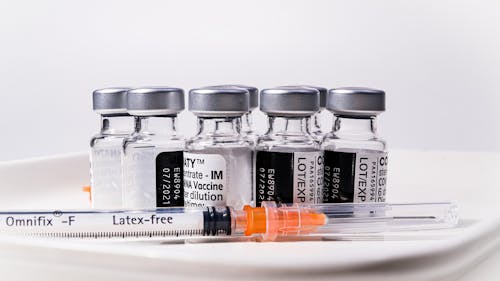Petition for Rutgers to require coronavirus vaccine for faculty, staff gains more than 750 signatures

A petition demanding a coronavirus disease (COVID-19) vaccine requirement for faculty and staff at Rutgers has collected more than 750 signatures and was presented last week to University President Jonathan Holloway, according to a press release.
The petition was sponsored by the Rutgers Community for a Covid-Free University, an organization formed this past July by Department of Chemistry and Chemical Biology professors Alan Goldman and Robert Boikess and Department of Biomedical Engineering professor Troy Shinbrot, according to the release.
Goldman said the organization was formed to push for a COVID-19 vaccination requirement for faculty and staff at Rutgers. Boikess said their goal comes from a concern for the health and well-being of students, faculty and staff.
“(With the mandate) I would certainly feel safer and less concerned about catching and transmitting the disease to loved ones and any other contacts,” Goldman said. “I’m sure many who have at-risk people in their homes would be even more relieved.”
Holloway cited labor management limitations as the reason for not requiring COVID-19 vaccination for faculty and staff during a Board of Governors meeting in April, according to the release.
Shinbrot said he accepted this reason initially but became disappointed after the University chose not to pursue the vaccine mandate that was voted on by the Rutgers branch of the American Association of University Professors and American Federation of Teachers. Goldman said labor management limitations are not a legitimate excuse to avoid mandating the vaccine for faculty and staff.
“If we are to return to in-person education (which we want to do), we feel that the University has an obligation to take reasonable precautions so that all students and employees, including vaccinated, do not catch and transmit a very deadly virus,” he said.
Shinbrot said the University’s hesitation to require the vaccine for faculty and staff increases the chance of COVID-19 transmission on campus as well as the chance for dangerous variants to develop. Additionally, he said the delay causes stress and anxiety for those returning to campus.
“How would you feel if you were a parent of a returning student: all their friends would be vaccinated, but they could be in classes or could meet with faculty standing in front of them lecturing loudly, and so spreading the virus highly efficiently,” Shinbrot said. “Wouldn't you be anxious, and wouldn't you rather the professors were vaccinated?”
Goldman said the University’s delay also demonstrates a lack of leadership, which contrasts with its image as the first college or university to require COVID-19 vaccinations for students. Other universities such as Princeton University, Stockton University, the University of California and the University of Michigan have already established vaccination requirements for faculty and staff, according to the release.
Goldman said the benefits of mandated faculty and staff vaccinations would include a decreased risk of illness to members of the Rutgers community, whether vaccinated and unvaccinated, as well as progress toward ending the pandemic. Boikess said a vaccination mandate for faculty and staff might also bring about social benefits for the Rutgers community.
“(The mandate) is an affirmation that we are all part of one academic community and that we care for each other,” he said.
The overall faculty and staff vaccination upload rate is currently at 82 percent, Holloway said, according to a University-wide email sent Wednesday. He said the University continues to work on increasing that percentage.
“For those employees who have not yet scheduled a vaccination, we strongly encourage you to do so as soon as possible, and we continue to offer walk-in vaccinations in Camden, Newark and Piscataway,” Holloway said.
Goldman said the vaccination requirement for health and safety workers at Rutgers has resulted in a 97 percent vaccination rate among those populations, which he said demonstrates that no other measure is as effective as mandatory vaccination at increasing vaccination rates.
In addition, Shinbrot said the University's 82 percent employee vaccination rate means there is still an approximate 1 in 5 chance that Rutgers community members could interact with an unvaccinated person and get exposed to the virus.
“So the question is, how do you get people who haven't been vaccinated to do so?” he said. “Vaccines have been available since December: People have had plenty of time to make their decision, and whatever reasons those 1 in 5 who have resisted vaccination have used to avoid vaccination will persist. Only by requiring vaccination will it actually happen.”
Shinbrot said the virus remains a serious threat and that communities need to stay vigilant to make campus as safe as possible, but mandatory faculty vaccinations may eventually lead to more relaxed restrictions on Rutgers campuses. Goldman said current scientific discoveries, rates of COVID-19 transmission among the general populace and vaccination rates at Rutgers all would play into such a decision.
“The sacrifices that students have made to date are tremendous,” Goldman said. “The University has an obligation to do everything possible to bring us back toward a normal life as quickly as possible.”



